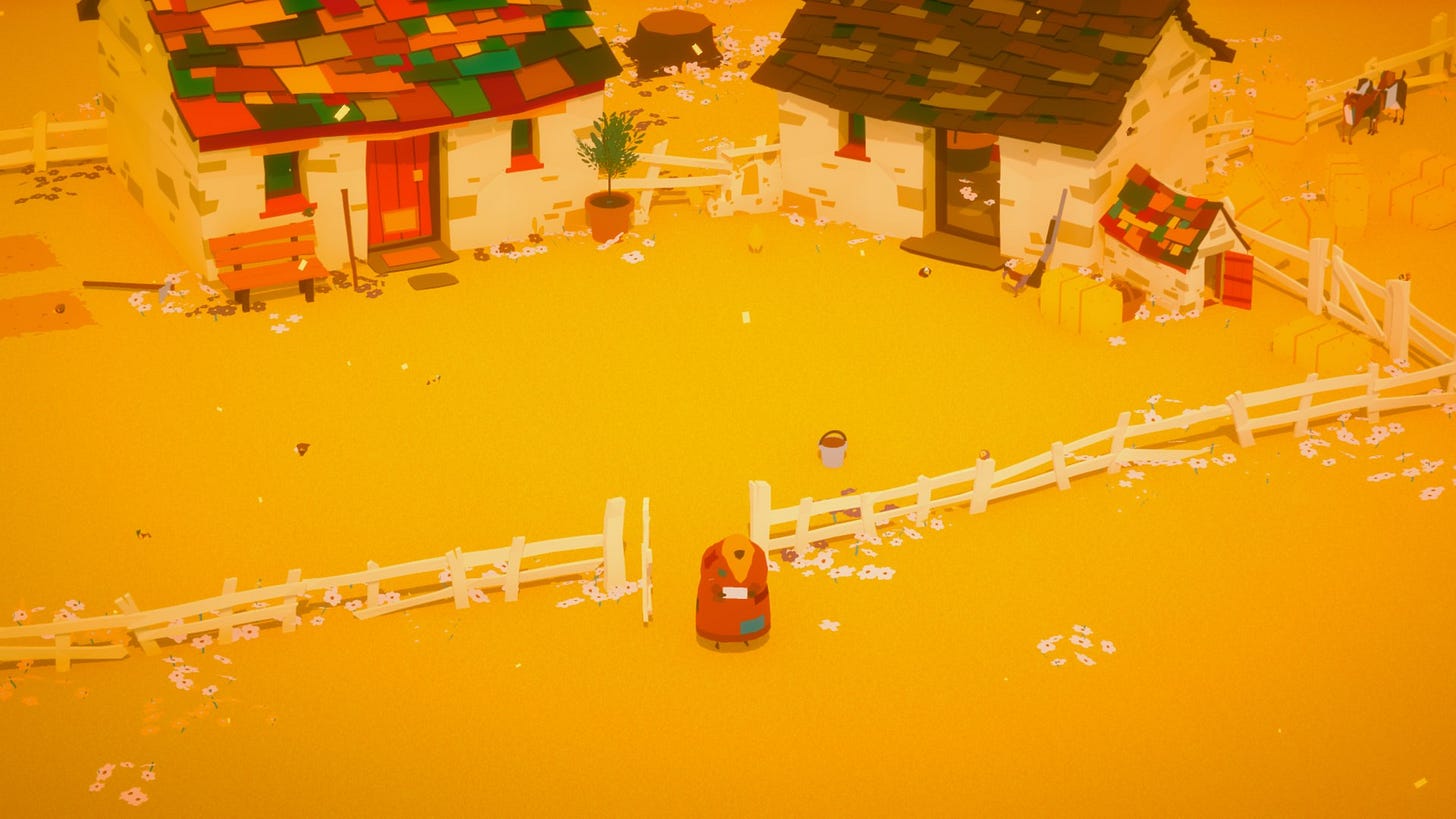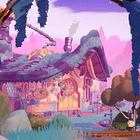This week: The Stillness of the Wind
It's a heavy one for me, folks. Mind the content warning.
Content warning: I will discuss death and dying in today’s piece. Nothing graphic, but these subjects are heavy even on a good day. Not a lot of jokes to tell about the game either. So if you aren’t feeling up to engaging, please don’t 🧡
This week’s recommendation is once again from Ash. Thank you friend, you know me so well.
If you would like to recommend a game for me to play, please do.
The Stillness of the Wind isn’t ostensibly a game about death, but I did think about death a lot while playing it. Early April brings back waves of grief that I thought to ride with a short contemplative game as my companion.
In one week, my father would have turned 60 years old. What an age, what a number. He was so young when he passed. It has barely been two years.
Talma, the protagonist of the game, is much older. She is the only one left in her village, her farm the only place in the desert still chugging along. Slowly, with effort, like Talma herself.
She is alive. She chuckles while petting her goats. She squeals in delight, harvesting potatoes. She is alone. She has a few chickens and a well just outside her homestead.
She eats, she milks the goats, she churns milk into cheese, and she chats with a travelling merchant who brings her letters from her family, from afar, from other planets. She likes reading books in her big comfy chair. Weather changes. A phone rings in the distance. Where is it?
She is alive. She is alone.
The quiet, suffocating melancholy of witnessing her aloneness is agony in my grief. But in a different mood, it’s fascinating. I think Talma doesn’t mind it. Her long life has brought her to this point. Now that’s the end of it, she is cocooned on her farm, insulated from the world, for better and for worse. There’s plenty of time for reflection and, yes, melancholy, and coming to terms with what it means to live when the world has moved on.
Would you? Would I?
The game is unrelentingly slow. I feel myself inch towards the screen, imploring Talma to move faster. My impatience is physically uncomfortable. This reminds me of Wanderstop, but Wanderstop was gentle and whimsical where The Stillness of the Wind is merciless in its futility.
Talma needs to eat at least once a day to be able to tend her farm. Daylight hours are limited, and she has much to do. Till, plant, water crops. A day gone. Chase the goats to milk them, churn the milk, make the cheese. A day and a half gone. Everything is so slow. Wolves come and kill one of my goats. If Talma had shuffled to her shotgun in time, would she have staved them off?
Maybe this death was programmed into the game, maybe not. Death is embedded into all of our lives in reality, too.
I could only describe my father as a Renaissance man, with all his talents and faults. So many friends and admirers. Living in a big beautiful city, surrounded by life. Still, my father was alone when he died. He was away from us, and we from him. We didn’t want that. Yet we were.
Talma’s family, too, loves her and remembers her. They write letters. The story of the game unfolds in these letters, painting a dystopian universe very (un)like our own. The story grows increasingly darker, somehow at some point throwing a bone of hope that’s as unlikely as an old lady scaring away a pack of wolves.
My chickens have disappeared. The seasons have changed. The game is hurtling towards the inevitable conclusion—how else could this all end?
The travelling merchant delivering letters to Talma is one of the constants of gameplay. On some days, he doesn’t come. No rhyme or reason to his absence, while shadows grow longer, and the sunlight fades to black.
The realization that one day, he will pass by one last time to never come back ever again hits much earlier before it happens. Few tethers remain to connect Talma’s isolated farm to the world. Which one is the last? When will it inevitably severe?
What happens when the firewood runs out?
The game is a narrative experience, not a farming simulator. You could treat it as such for a time; no harm in that—except your frustration. In the end, there is palpable relief in giving up. What if it all just faded away? When is it okay to let go?
The game’s narrative is heavy-handed at times, maybe. Its themes ache like old bones. Maybe it was my state of mind that made me feel it all as deeply as I did.
Maybe that is the point.
…
The world turns white. The farm lies desolate. The desert claims the shed.






This was a beautiful piece, and I think I was also feeling a lot of grief when I played this the first time.
For me, it played like an art film and the slow, building panic of realizing things were changing slowly, and then quickly made me choke a few times. I didn't notice right away, but when the merchant didn't come for a few days, I started wondering. I started exploring once the goats were gone, once the chickens were gone, but there really was nothing. For me, sitting on it later, it felt like a metaphor for tradition slowly giving away to a more poison world. I think it could have been the industrial revolution, or colonization, or just modernization vs. an old woman who's only ever known the one life.
Thank you for sharing this, and I hope it didn't get you down too much. <3
This was wonderfully written. Thanks for sharing.